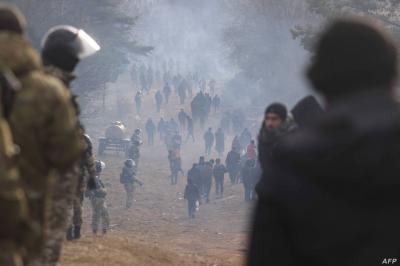Under the title "Migrant Crisis at the Belarusian Border: Europe Faces a New Kind of War," Al-Hurra reported that in an attempt to deter Russian forces and tanks, NATO has maintained a military presence in Poland. However, this Western alliance is facing an unconventional challenge as at least 2,000 people from the Middle East attempted to cross into Poland via Belarus, a close ally of Russia. European officials accuse Belarus of encouraging human traffickers to bring migrants in and then directing them toward the EU border in an attempt to provoke a crisis. In response, Belarus denies this but stated that it cannot help resolve the issue unless Europe lifts sanctions.
The EU has imposed several rounds of sanctions in response to President Alexander Lukashenko’s violent crackdown on street protests against his rule in 2020. Tensions are rising as Poland deploys more soldiers along the border to prevent migrants, mostly from Iraq and Afghanistan, from entering. Russia claims these troop movements are a threat and responded by sending bombers to patrol over Belarus. Last summer, Belarus issued tourist visas to individuals from Iraq, Syria, Yemen, and other countries, which EU officials described as a coordinated effort to encourage them to reach the EU border.
In a press conference, Lukashenko pointed out that Russian warplanes are capable of carrying nuclear weapons. Last week, Lukashenko threatened to halt Russian gas supplies that are delivered to Europe via Belarus. The Kremlin appeared to distance itself from this threat on Friday, stating that it had not been consulted beforehand about the remarks and that it would fulfill its gas delivery contracts.
On the other side, Polish Prime Minister Mateusz Morawiecki stated on Facebook on Thursday: "What we are dealing with is a new kind of war in which civilians and media messages are ammunition," as quoted by The Wall Street Journal. The Polish government claims that Belarus is involved in "hybrid aggressive actions" to incite conflict at the border while the world watches. Other Western officials believe that President Vladimir Putin wants to create a dramatic scene to undermine the West, but this will not escalate to actual armed conflict.
Defense ministers from Estonia, Latvia, and Lithuania warned on Thursday about the risks of military confrontation. Russia, which denied any involvement, stated that the EU should engage with Belarus to resolve the crisis. Belarusian Defense Minister Viktor Khrenin asserted that the military activities of its neighbors—particularly Poland—are unrelated to the migrant crisis and may indicate a readiness to unleash a conflict in which they wish to involve Europe to solve their internal political problems, as well as issues related to relations within the EU.
The confrontation involves significantly fewer migrants than the flows seen in Europe after 2015. On most days, only a few dozen asylum seekers manage to cross the border. Migrants are enduring extremely cold conditions, reaching freezing temperatures at the border between Belarus and the EU member states of Poland and Lithuania, both of which refuse to allow them to pass. Some have already died, raising concerns for the safety of those remaining as severe winter conditions approach.
The Wall Street Journal reported comments from Elizabeth Price, a senior fellow at the American Enterprise Institute in Washington, stating, "This is a public relations campaign. They know how migration can cause division and how images of migrants will create a toxic gap between citizens and their governments." Last Thursday, Belarus allowed officials from the UN High Commissioner for Refugees and the International Organization for Migration to visit a temporary camp near the border housing nearly 2,000 people, including children and pregnant women, as reported by the agency on Friday. Relief workers are racing to provide assistance as the winter season approaches.




